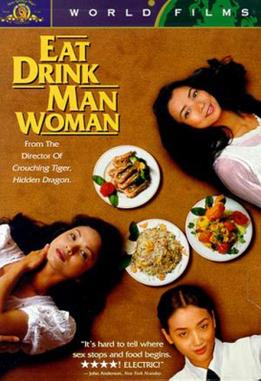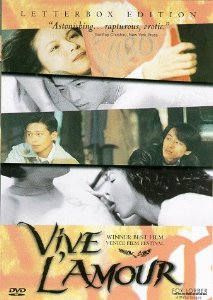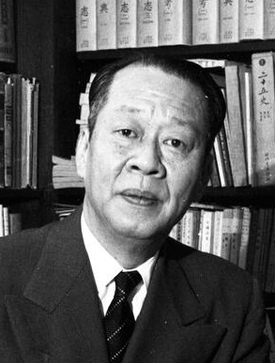Related Research Articles

Farewell My Concubine is a 1993 Chinese historical drama film directed by Chen Kaige, starring Leslie Cheung, Gong Li and Zhang Fengyi. Adapted for the screen by Lu Wei based on the novel by Lilian Lee, the film is set in a politically tumultuous 20th-century China, from the early days of the Republic of China to the aftermath of the Cultural Revolution. It chronicles the troubled relationships between two Peking opera actors and lifelong friends Cheng Dieyi (Cheung) and Duan Xiaolou (Zhang), and Xiaolou's wife Juxian (Gong).

Eat Drink Man Woman is a 1994 Taiwanese comedy-drama film directed by Ang Lee, from a script co-written with James Schamus and Hui-Ling Wang. It stars Sihung Lung, Wang Yu-wen, Wu Chien-lien, and Yang Kuei-mei. as members of the Zhu family navigate the challenges of love, life, tradition and family. Part of Lee's "Father Knows Best" trilogy and similar to Lee's other works, this film deals with the transition from tradition to modernity. It is Lee's only film, to date, to be shot entirely in his native Taiwan.
Pushing Hands is a 1991 comedy-drama film directed by Taiwanese filmmaker Ang Lee, his feature directorial debut. It stars Sihung Lung as a Chinese Tai Chi master living in New York, who struggles to find his place in the world. The film shows the contrast between traditional Chinese ideas of Confucian relationships within a family and the much more informal Western emphasis on the individual. Together with Ang Lee's two following films, The Wedding Banquet (1993) and Eat Drink Man Woman (1994), it forms his "Father Knows Best" trilogy, each of which deals with conflicts between an older and more traditional generation and their children as they confront a world of change.

Sinophone, which means "Chinese-speaking", typically refers to an individual who speaks at least one variety of the Chinese language. Academic writers often use the term Sinophone in two definitions: either specifically "Chinese-speaking populations where it is a minority language, excluding Mainland China, Hong Kong, Macau, and Taiwan" or generally "Chinese-speaking areas, including where it is an official language". Many authors use the collocation Sinophone world or Chinese-speaking world to mean the Chinese-speaking world itself or the distribution of the Chinese diaspora outside of Greater China.

Vive L'Amour is a 1994 Taiwanese New Wave film directed by Tsai Ming-liang. It is Tsai's second feature film and premiered at the 51st Venice International Film Festival, where it won the prestigious Golden Lion. The film is about three people who unknowingly share an apartment in Taipei.

A City of Sadness is a 1989 Taiwanese historical drama directed by Hou Hsiao-hsien. It tells the story of a family embroiled in the "White Terror" that was wrought on the Taiwanese people by the Kuomintang government (KMT) after their arrival from mainland China in the late 1940s, during which thousands of Taiwanese and recent emigres from the Mainland were rounded up, shot, and/or sent to prison. The film was the first to deal openly with the KMT's authoritarian misdeeds after its 1945 takeover of Taiwan, which had been relinquished following Japan's defeat in World War II, and the first to depict the February 28 Incident of 1947, in which thousands of people were massacred by the KMT.

A Touch of Zen is a 1971 taiwanese wuxia film co-edited, written, and directed by King Hu. Its screenplay is based on a classic Chinese story "Xianü" in the book Strange Stories from a Chinese Studio by Pu Songling. The film is set in the Ming dynasty under the dominance of eunuchs and narrates multiple themes of transcendence of dichotomies, Zen Buddhism, feminism, conservative female roles, and the ghost story. At the 1975 Cannes Film Festival, the film won the Technical Grand Prize award.
Secret Love in Peach Blossom Land, also known as Secret Love for the Peach Blossom Spring, written by Stan Lai (Chinese:賴聲川) was the second stage play by the Performance Workshop (表演工作坊) in 1986, and also the first successful modern stage play in Taiwan. It combines two unrelated plays – a tragedy and a comedy – on the same stage, mixing seriousness with banters. The play for which the Performance Workshop is best-known, it is "considered an iconic mainstay of contemporary Chinese theater."
The Big Parade is a 1986 Chinese film directed by Chen Kaige. It is the story of a tough drill sergeant and his raw recruits, and was photographed by Zhang Yimou.
Transnational cinema is a developing concept within film studies that encompasses a range of theories relating to the effects of globalization upon the cultural and economic aspects of film. It incorporates the debates and influences of postnationalism, postcolonialism, consumerism and Third cinema, amongst many other topics.

Margaret Tu Chuan was a Hong Kong actress.

Death Over Shanghai is a 1932 German thriller film directed by Rolf Randolf and starring Gerda Maurus, Else Elster and Theodor Loos. The Chinese Ministry of Education requested that the German government have the film destroyed because they had received reports that it "ridiculed China and the Chinese people".

Huang Yu-shan is a Taiwanese filmmaker. She has made significant contributions to Chinese cinema in the areas of aesthetics and cultural history. Her focus is the woman's viewpoint, and frequently challenges the status quo in what has been a male-dominated society.
Yingxiang was an important film journal published in Taiwan, comparable in its significance as a platform of debate to the importance of the Cahiers du Cinéma for the French debate about film, the significance of Bianco e nero in the Italian context, the impact of Filmkritik in Germany and of Screen for English-speaking cinema lovers.

The 26th Golden Melody Awards ceremony for popular music category was held on June 27, 2015. The TTV network broadcast the show live from the Taipei Arena in Taipei, Taiwan. The ceremony recognized the best recordings, compositions, and artists of the eligibility year, which runs from January 1, 2014 to December 31, 2014.
Chi-chen Wang was a Chinese-born American literary scholar and translator. He taught as a professor at Columbia University from 1929 until his retirement in 1965.

The Love Song is a 2016 Taiwanese romance, television series starring Miao Ke-li, Lu Hsueh-Feng, Vivi Lee, Darren Chiu, Tracy Chou, Sean Lee, Steven Sun and Julie Ting. Shooting began on January 15, 2016 and episodes aired as soon as the shoot finished. The original broadcast began on February 24, 2016 on SET Metro, airing weekdays at 8:00 pm.
The Institute of Revolutionary Practice is an educational institution established in 1949, and affiliated with the Kuomintang.

Ch'ên Shou-yi was a Chinese-American literary historian and cultural studies scholar. He is known for his contributions to the comparative cultural studies of China and the West. He was a professor at Pomona College in Claremont, California from 1941 to 1967.

Children of Marx and Coca-Cola : Chinese Avant-garde Art and Independent Cinema is a 2009 non-fiction book by Xiaoping Lin, published by the University of Hawaii Press.
References
- Chen, Robert Ru Shou (1999). "Sheldon Hsiao-peng Lu. Transnational Chinese cinemas : identity, nationhood, gender". Journal of Modern Literature in Chinese . Lingnan University. 3 (1): 152–155. - Profile
- Clark, Paul (2000). "Transnational Chinese Cinemas: Identity, Nationhood, Gender, and: Film in Contemporary China: Critical Debates, 1979-1989 (review)". China Review International . 7 (1): 132–135. doi:10.1353/cri.2000.0012.
- Rosen, Stanley (2000). "Transnational Chinese Cinemas: Identity, Nationhood, Gender . Sheldon Hsiao-peng Lu". The China Journal . Canberra. 43: 209–210. doi:10.2307/2667571. JSTOR 2667571.